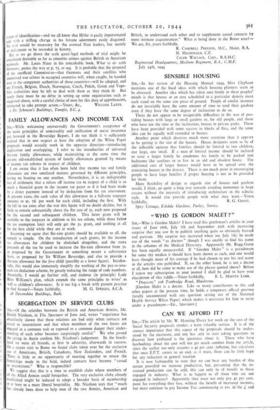FAMILY ALLOWANCES AND INCOME TAX
Six,—While welcoming unreservedly the Government's acceptance of the main principles of universality and unification of social insurance put forward in the Beveridge Report, I do not think it is sufficiently realised that in one respect at least the adoption of the White Paper proposals would actually work in the opposite direction—introducing duplication and overlapping. I refer to the introductibn of universal flat-rate family allowances, while maintaining at the same time the present old-established system of family allowances granted by means of income tax rebates in respect of children.
I am aware that it has often been held that income tax and family allowances are two unrelated matters governed by different principles, having no bearing on one another. Nevertheless, it is an indisputable fact of arithmetic that a rebate off income tax in respect of a child is as much a financial grant to the income tax payer as if it had been made by a direct payment instead of by deduction from his tax assessment. At present rates,-the cash value of this allowance to a full-rate taxpayer amounts to 9s. 7d. per week for each child, including the first. With the fall in tax rates after the war this figure will no doubt decline, but is likely to remain substantially above the flat rate of 5s. each now proposed for the second and subsequent children. This latter grant will be available to the taxpayer in addition to his tax rebate, while those below the tax exemption limit will only get the- 5s. grant, and nothing at all for the first child while they are at work.
Assuming we agree that flat-rate grants should be available to all, the remedy is simple. On the introduction of such grants, let the income tax allowances for children be abolished altogether, and the extra proceeds of the tax be used to increase the flat-rate allowance from 5s. as proposed by the Government to something nearer a subsistence basis, as proposed by Sir William Beveridge, and also to provide a flat-rate allowance for the first child (possibly at a lower figure). Inciden- !ally, this would also immensely simplify the working of the pay-as-you- earn tax deduction scheme, by greatly reducing the range of code numbers. Personally, I would go further still, and endorse (in principle) Lady Rhys Williams's plan, which extends the same principles to wives' as well as children's allowances. Is it too big a break with present practice


























 Previous page
Previous page